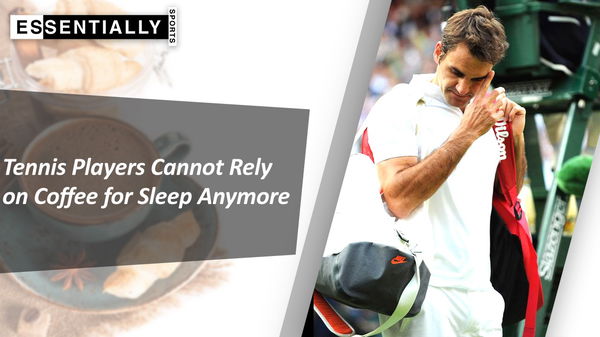
via Imago
Roger Federer

via Imago
Roger Federer
The quality of sleep and the state of mind share a close relationship with the tennis player’s performance on the court. In general, the study and research state that tennis players with poor sleep quality have are more indecisive than with those athletes with proper sleep. The poor quality of sleep gives rise to the increase in the confusion level during a match amongst the athletes. Due to extreme physical effort, the deficiency of sleep can consequently affect the cardio-respiratory and muscle functions of the player.
Frequently, tennis players tend to get sleep deprivation a night before their match predominantly due to anxiety, travel and jet-lag. Tennis is a sport which demands an enormous amount of strength, energy and endurance during the match and cognitive skills for determining the accuracy on the court. They are built amongst the athletes with everyday practice and all these parameters go haywire if the player experiences sleep deprivation.
Tennis players are tending to consume caffeine, which is a permitted substance, in order to recover from their arduous training sessions. The substance caffeine is widely known for fighting sleepiness, but not much information is floated on the role of caffeine for the prevention of sleep loss where cognitive skills come into the picture.
ADVERTISEMENT
Article continues below this ad

via Imago
Serena Williams orders an espresso in the middle of the match
The research was carried out by the Sleep Research Centre at Loughborough University in the United Kingdom to test the effects after the consumption of caffeine amongst the sleep-deprived tennis players and the impact on their serving accuracies.
Two studies were undertaken, the first study is the sleep restriction versus normal sleep, on the serving accuracy of the semiprofessional tennis players (comprising of eight men and eight women) was measured. Their sleep was restricted from two to two and a half hours (usual sleeping time is considered to six and a half to eight hours), a night before the testing and the next day, their testing began at 2 pm in the afternoon. The second study (comprising of six men and six women) was similar to the first one, except for an extra sleep restriction condition with 80 mg caffeine vs placebo in a sugar-free drink was given to the players thirty minutes prior to the testing.
In the first study, the tennis players were asked not to consider their serves as ‘first or second serves’ but their objective was to serve inside service box and on a particular target which was clearly marked with white masking tape. If the ball touched any of the boundary lines then the service was considered to be ‘out’. All the participants were given forty serves and the first ten were disregarded in order to provide a warm-up for the next serves (the participants were unaware of the deduction). The string tensions of the racquets ranged from 50 and 65 pounds.

via Imago
Target (Referred from Sleep restriction and serving accuracy in performance tennis players, and effects of caffeine)
The second study was carried out a year later than the first one. The similar pattern from the first one was followed in the second study and incorporating an extra sugar-free drink consumed thirty minutes before the testing and the drink contained 80mg caffeine, given double-blind. The further procedures for the second study were similar to the first one.
ADVERTISEMENT
Article continues below this ad
The results in both the studies concluded that the sleep restriction reduced about one-third affects serving performance amongst the tennis players. There was no significant difference in the results obtained from study one (where caffeine was nil) and study two (where caffeine was used). The results were very similar across studies and also for both the sexes.

via Imago
Study One Results (Referred from Sleep restriction and serving accuracy in performance tennis players, and effects of caffeine)

via Imago
Study Two Results (Referred from Sleep restriction and serving accuracy in performance tennis players, and effects of caffeine)
With the sleep reduction, the cognitive aspect of the game is affected leading to the decline in the player’s performance. Also, the dosage of caffeine had no influence in enhancing the deteriorating performance of the player on the court.
ADVERTISEMENT
Article continues below this ad
ADVERTISEMENT
ADVERTISEMENT
ADVERTISEMENT
ADVERTISEMENT

